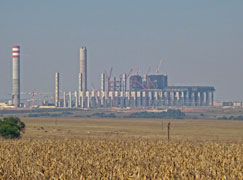Investment in African mega projects on the boil
10 March 2015
Investment in African mega projects surged 46% to $326-billion (almost R4-trillion) in
2014, led by heavy investment in transport, energy and power, according to the third
annual
Deloitte African Construction Trends Report, which monitors
progress on capital intensive infrastructure on the continent.
To qualify for inclusion in the report, projects must be valued at more than $50-
million and had to have broken ground by at least 1 June 2014. While the number of
projects that qualified for inclusion in the 2014 report fell to 257 from 322 the year
before, the total value of projects under construction increased from $222.77-billion
in 2013.
"Africa's rapidly growing middle class continues to drive demand for sustainable social
infrastructure," said Andre Pottas, Deloitte regional director. "Africa is en route to a
brighter future and overall we see the opportunities surpassing the challenges facing
our
continent."
Of the projects in the 2014
Deloitte African Construction Trends Report,
143 were led by the public sector; a further 88 were private sector initiatives and 26
were classified as public private partnerships (PPPs). Energy and power accounted
for 37% of the mega projects undertaken in Africa in 2014, followed by transport
(34%), mining (9%), property (6%), water (5%), oil and gas (4%), mixed use
facilities (2%) and health care (1%).
"More than 10% of the projects included in this year's survey were structured as
PPPs, which is an increase from about 4% the previous year," said Pottas. "That is
very encouraging to see as we believe that significant private sector participation is
required alongside government initiatives in order to enable Africa to close its
infrastructure gap with the rest of the world."
Southern Africa led construction activity on the continent, accounting for $144.89-
billion in projects, or 44.5% of the
total value. West Africa overtook East Africa, with
the region attracting $74.84-billion in projects, or 23% of the total projects on the
continent by value.
Central Africa experienced a massive 117% surge in the value of construction
projects, which reached $33.21-billion while North Africa saw the value of
construction projects jump almost 36% to $9.12-billion. East Africa experienced a
moderate 10% decline in the value of projects, which nevertheless totalled a
respectable $60.67-billion in 2014.
"Africa continues to be a magnet for foreign direct investment (FDI) and intra-African
capital inflows," said Pottas. "With a 76% completion rate of projects collected from
our previous report, expectations remain high for infrastructure to provide the
developing continent with much needed market expansion."
Africa's infrastructural transformation is being driven by increased output in the
natural resources sector, which in turn has underpinned
rising fiscal expenditure on
infrastructure projects to facilitate rising international trade with the continent.
At the same time, rapidly growing urbanisation and rising domestic demand in Africa
has ushered in an unprecedented wave of foreign direct investment in the continent's
biggest and most dynamic economies.
"The African Construction Trends report confirms continued, intensive construction
activity across the continent. The journey may not be high speed just yet but it is
unfolding at a steadily increasing pace."
Source: Deloitte
 Kusile Power Station, in Mpumalanga, under construction in April 2014. (Image: Leo za1 / © Rute Martins of Leoa's Photography, via Wikimedia Commons)
Kusile Power Station, in Mpumalanga, under construction in April 2014. (Image: Leo za1 / © Rute Martins of Leoa's Photography, via Wikimedia Commons)




